Whose Line is it Anyway?
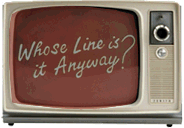
Contents |
Host
Co-hosts
Team captains (radio): John Sessions and Stephen Fry
Regular guests (TV): Ryan Stiles, Colin Mochrie, Greg Proops, Josie Lawrence, Tony Slattery, Mike McShane, Stephen Frost, John Sessions, Paul Merton, Brad Sherwood and Sandi Toksvig
Musician: Colin Sell (radio), Richard Vranch (TV, 1988-98), Laura Hall (1998-9), Win Meyerson (1999, but see Trivia)
Broadcast
BBC Radio 4, 2 January to 6 February 1988 (6 episodes in 1 series)
Hat Trick Productions for Channel 4, 23 September 1988 to 4 February 1999 (136 episodes in 10 series)
Hat Trick Productions for BBC1, 10 March 1989 (Comic Relief special)
bbc.co.uk webcast, 5 to 6 March 2011 (24 Hour Panel People)
Synopsis
Now. When we write these entries for this fine A-Z you are reading we need to find some way to 'get into' the show via the introduction. Sometimes we know instinctively what to write but other times we need to make it up as we go along.
Which rather brilliantly leads us into Whose Line Is It Anyway? where Clive Anderson challenges four actors and comedians to make it up as they go along. This show ran for billions of years (well, ten) and yet still effortlessly got laughs all round.
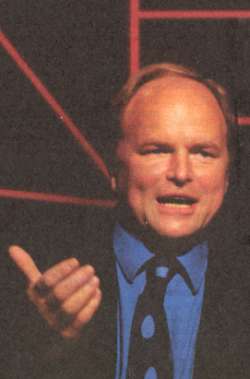 Host, Clive Anderson
Host, Clive AndersonAlthough purists may argue that it was always funnier in its early days. They may have a point. Whilst Greg Proops, Colin Mochrie, Ryan Styles and Co. did a splendid job, for real hilarity you have some way to go before you can beat the old class of say, John Sessions, Stephen Fry, Josie Lawrence, Tony Slattery, Paul Merton, Sandi Toksvig et al. But maybe that's just us.
Rounds would include things like 'Film and Theatre Styles' where two players would act out a scene given by Clive who would buzz in and instruct the players to suddenly act it out in style of his choosing, from a pool of ideas the audience has shouted out.
And then there's 'Party Quirks', a game where one player is hosting a party and the other three are joining but have a quirk that members of the audience have written down beforehand. The host of the party has to work out what the quirks are.
And then there's the 'Rap', which turned into a 'March' and finally into a 'Hoedown' to finish off the show. These rounds tend to be very funny, especially when Stephen Fry is playing because he hates it and often goes into a random made up poem which doesn't fit the tune at all. You have to see it really.
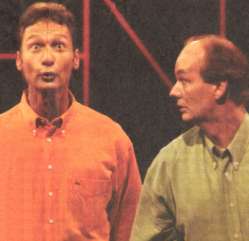 Colin Mochrie (right) does some slo-mo damage to Ryan Stiles
Colin Mochrie (right) does some slo-mo damage to Ryan StilesClive gives out the points randomly, but whoever 'wins' has the rather dubious honour of reading out the credits in a style of Clive's choosing.
Clever actors, wit and lots of comic interplay between players and Clive make this an almost must-see programme, especially when it's on form.
The programme regularly travelled to America and even spawned an American counterpart hosted by Drew Carey, of The Drew Carey Show no less.
Key moments
That game of Party Quirks called by Anderson "the worst game of Party Quirks I've ever seen" after he buzzed to end it, where the host of the party (Tony Slattery) only managed to correctly identify one of his guests' quirks. We won't repeat what the host of the party Tony Slattery told Clive Anderson to do after being told what his guests' quirks were…
…suffice to say he promptly had all the points he had ever earned on the show deducted for saying it. Rather uniquely, in the days before strong language on TV was such commonplace, this incident went out uncensored.
Catchphrases
"And I'll just add up the points from that round..."
"And the winner gets to read out the closing credits in a style of my choosing..."
"This is me, Clive Anderson, saying goodnight. Goodnight."
Inventor
Dan Patterson and Mark Leveson
Theme music
Philip Pope
Trivia
Many of the stars in 'Whose Line' are or were members of The Comedy Store Players, a improvisation group formed in October 1985 and featuring the likes of Merton, Lawrence and even Richard Vranch at the piano. They're still performing today.
Over the course of a single taping, games featured on the show were played several times which also meant that there would be more than enough material to choose from.
Because of this approach in production, there were at least two compilation specials at the end of each series featuring some of the unseen footage. However, in the 1997 series, an extra 7 episodes were also broadcast.
Review copies of the DVD contained a clanger - they'd spelt the first word as Who's.
In the pilot (which was broadcast, incidentally), the improvisors were perched on rather unsuitable stools.
The show (at least, when they were not in Hollywood) was originally recorded at Limehouse Studios in London's Docklands. Thames' Teddington Studios was used from the second series onwards before it was moved again to LWT's South Bank base a few years later.
Clive Anderson had two buttons for sound effects - a buzzer and a door bell - but often they were wired up to the wrong noises. Each successive generation of his desk re-instated the mistake.
Was it rigged? Apparently not. John Sessions and Josie Lawrence both recall early occasions when producer Dan Patterson would seed ideas for rounds and say "it would be good if you could get this in", but the improvs worried about these suggestions so much they rarely worked.
Why did a BBC Radio show transfer to Channel 4? A tape had been sent to the relevant department head at the BBC, and there it lay. In the meantime, the producers had been talking to one of their original contestants - Jimmy Mulville - whose newly-founded Hat Trick Productions were keen on the idea. When the BBC came round to possibly offering a pilot show, even though it was really a "radio idea", they were told "Thanks, but Channel 4 have offered us a 13 part series and we start filming next week." One episode did ooze on to BBC1 in 1989, for Comic Relief.
Colin Sell was the original pianist for the radio version before being replaced by Richard Vranch for the TV version. Vranch was not taken to Hollywood for the final series, so Laura Hall was brought in for most of the tapings - and remained in her role for the American version. However, she skipped one taping as her mother was unwell, and was replaced by Win Meyerson; although he was credited in episode seven, nothing of his would air until episode eleven, the very last episode.
All episodes are available on All4, except for the edition broadcast 29 September 1995. If anyone knows what was wrong with it, do write in.
Merchandise
'The Best Of...' video release
Web links
Pictures
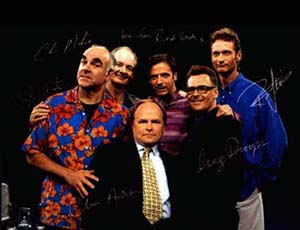 Clockwise from left: Stephen Frost, Colin Mochrie, Richard Vranch, Greg Proops, Ryan Stiles, Clive Anderson.
Clockwise from left: Stephen Frost, Colin Mochrie, Richard Vranch, Greg Proops, Ryan Stiles, Clive Anderson.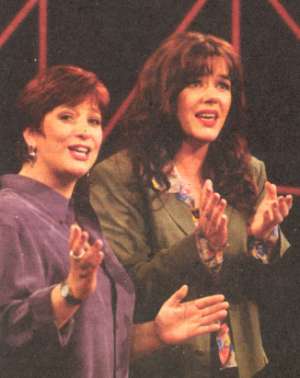 Caroline Quentin and Josie Lawrence
Caroline Quentin and Josie LawrenceSee also
From the same devisors:

